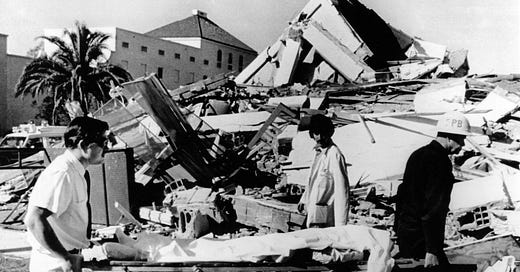Day 5: An earthquake in the courtroom
Director Braverman is asked why VA can build housing for administrators but not veterans. Also, Judge Carter zeros in on HUD's tenuous policy shift — and whether it will actually change anything.

An earthquake roiled the First Street U.S. Courthouse in downtown Los Angeles, Monday, shaking up proceedings in Powers v. McDonough, a lawsuit brought by disabled veterans suing the department of Veterans Affairs for access to housing.
The magnitude 4.4 tremor is not the first time a quake hit veterans fighting for housing in LA. At least 46 of the more than 60 people who died in 1971’s San Fernando earthquake were veterans at the VA’s Sylmar facility. Ultimately, the disaster lead to the eviction of all veterans living at the West LA VA, resulting in today’s ongoing unhoused veterans crisis. For more on how that natural disaster changed the fate of generations of veterans, read “The Land War.” Part Three of Home of the Brave.
The trial’s fifth day began with the conclusion of testimony by Deputy Medical Center John Kuhn and the start of examination of former Medical Center Director Steven Braverman. Kuhn began the trial’s day by being examined by the defense counsel, touching on the decline in veteran homelessness in the City of Los Angeles since he assumed his position at the Greater Los Angeles VA.
When Kuhn arrived in Los Angeles in 2022, there were about 4,000 homeless veterans in the city, he said. In 2024, there were 2,991 homeless veterans in the city, according to a point-in-time count conducted by the Los Angeles Homeless Services Authority. “I think it demonstrates that the innovations and the approach we're taking in Los Angeles have an effect,” he said.
On cross-examination from plaintiff’s counsel Roman Silberfeld, he acknowledged however that “we can't determine direct causality.”
Kuhn also detailed some of his efforts to add to the permanent housing inventory available to veterans including at sites off of the West LA campus “The campus is certainly an important feature of our ability to place veterans in housing,” he said. “We have the ground, there's a lot of undeveloped area on the grounds, and the opportunity to build housing is being taken advantage of. But we also need to build housing throughout the community; it cannot just be in West LA.”
“Many veterans don't want to live in West LA,” he added. “They don't want to live in a hospital. They want to live in the community.”
Kuhn said there was “danger in messaging that the place to live, if you're a homeless veteran, is the West VA campus.”
Kuhn also expressed skepticism about the “demand” for the volume of new permanent housing units at the West LA campus called for by the Master Plan (1,200) and some experts (2,800). “From a demand perspective, it's not evident to me that that's necessary,” he said, referring to the point in time count.
Kuhn also said the construction of an additional 1,000 units of temporary housing on the campus called for by some experts “would be a fantastic waste of resources.”
“Why would we spend funds on something that's not going to solve homelessness,” Kuhn said, stating that across the VA of Greater Los Angeles service area, there are approximately 300 open beds per night.
Judge Carter asked Kuhn how many open beds there are nightly on campus. Kuhn answered that there are approximately 35.
Silberfeld challenged Kuhn regarding the need for temporary housing.
“Mr. Kuhn, if something isn't done to create temporary housing on campus, veterans on the street will die, isn’t that true,” Silberman asked.
“No, that's not true,” Kuhn answered. “We have sufficient temporary housing to get veterans off the street. Getting them to accept the temporary housing is a greater challenge.”
“Many veterans don't want to live in West LA. They don't want to live in a hospital. They want to live in the community.” —John Kuhn, deputy medical center director at the Greater Los Angeles healthcare system
Following the conclusion of Kuhn’s testimony, Steven Braverman took the stand. Braverman served as the director of the Medical Center until 2023 when he became Network Director for the VA’s Desert Pacific Healthcare network which includes the systems of Greater Los Angeles, New Mexico, Long Beach, and others.
“You would agree, would you not, that those (homeless) encampments are not conducive to good health, correct,” asked plaintiff’s counsel Mark Rosenbaum.
“I would say that… in general, it's not a place that I would want to be,” Braverman said. “But at the same time, there is some comradeship and other things in some of those encampments that people find reduces their stress.”
Rosenbaum then pressed Braverman on his home on the West LA VA campus, one of the two single-family homes on the 388-acre property.
“The reason that you lived on the West LA grounds was so that you could be close to the medical center, isn’t that, right,” Rosenbaum asked.
“Yes,” Braverman answered.
“That house, sir, it's your understanding that that house was constructed by the VA, isn't that right?”
“I believe that's true.”
Braverman also testified about additional on-campus housing units in which members of the medical center’s executive team and other staff members reside.
“These are all on West LA grounds, is that right,” Rosenbaum asked.
“Yes,” Braverman answered.
“There are sidewalks there?”
“Yes,” replied Braverman.
“It’s a little community?” asked Rosenbaum.
“Yes,” said Braverman.
Braverman also answered questions about Building 209 which has been a point of contention for the campus. “(Building) 209 was an existing building that was built by the VA, that was renovated in approximately 2012 or to be used to house veterans in a residential treatment program called compensated work therapy,” he said.
Rosenbaum asked if the renovations to the building were made “for the purpose of providing access to health care.”
“Yes, I think that's fair to say,” Braverman said.
The homeless industrial complex

“If one building is emblematic of the West LA VA’s 136-year potential to serve — and frustrate — veterans, it’s Building 209,” writes Jasper Craven in “Carving up the Map,” Part Four of Home of the Brave. “It shows how the property’s map isn’t the only thing that’s been carved up: The housing itself is being whittled away by third-party leases, too.”
Building 209 first opened in June 2015, after a $20 million, VA-funded renovation that had been approved in 2010. More than 55 veterans lived there, working in VA-provided jobs in a transitional Compensated Work Therapy program. Then, in June 2017, the VA leased the building to outside developers and case managers and held a second opening ceremony for it — a bizarre moment in which the department patted itself on the back for a milestone that had occurred two years prior.
The VA funded and renovated Building 209 on its own, but now only works with HUD and third-party developers to build housing on the West LA campus. Why? Read “Carving up the Map” to find out.
During Rosenbaum's questioning of Braverman about HUD’s policy change last week regarding veterans' disability payments no longer being considered as income for the purposes of housing eligibility, Judge Carter interjected with concerns.
In a release submitted into evidence, HUD encouraged state and local housing authorities to also make coinciding changes, but did not mandate that changes be made.
Braverman said he was optimistic that state and local jurisdictions would make the necessary changes to their rules, thus making them eligible for more affordable housing units.
Carter said he was in an “uncomfortable” position deciding the case while the details of the rule change were still being worked out at the federal and local levels.
“Now I'm going to ask you,” Carter said, turning to Braverman, “Do you have any information of any discussion about removing all service-connected disability, or is this going to be some kind of equation… that leaves some people, quite frankly, standing outside in terms of their benefits?”
Braverman answered that he believed all service-connected disability payments would be removed from consideration.
“So sitting here today, you cannot tell Judge Carter with 100 percent certainty that in determining eligibility for unhoused veterans with disabilities for permanent supportive housing — either on the VA grounds or in the community — that they [disability payments] not be counted as income.” Rosenbaum said. “Isn't that true, sir?”
“I would be shocked if that didn’t come to pass,” Braverman answered.
Proceedings for Powers v. McDonough will continue on Tuesday, August 13 at 8:30 a.m.






